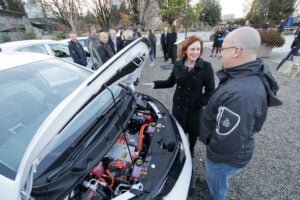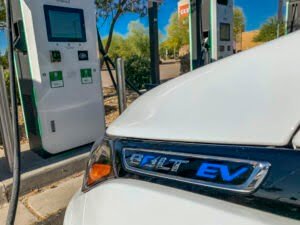The Cost of Owning an Electric Vehicle (EV)
Electric vehicles (EVs) have gained significant popularity in recent years due to their environmental benefits and potential cost savings. While it’s true that EVs can be more cost-effective in the long run compared to traditional gasoline-powered vehicles, it’s important to consider the full picture when it comes to the expenses associated with owning an EV. In this article, we will explore the various costs and hidden expenses of owning an EV.
Maintenance Myths: EVs Aren’t Maintenance-Free
One of the first things to consider when purchasing an electric vehicle is the upfront cost. EVs tend to have a higher initial price tag compared to their gasoline counterparts. This is primarily due to the expensive battery technology used in EVs. However, it’s worth noting that the cost of EVs has been steadily decreasing over the years, making them more affordable for a wider range of consumers.
In addition to the upfront cost, EV owners also need to consider the cost of charging their vehicles. While charging at home is generally more cost-effective compared to refueling at a gas station, there are still some expenses to take into account. For instance, installing a home charging station can be quite expensive, especially if you don’t already have the necessary infrastructure in place. Additionally, the cost of electricity can vary depending on your location and the time of day you charge your vehicle.
Beyond the Green Glow – A Look at Ownership Costs
Maintenance and repairs are another aspect of EV ownership that should not be overlooked. While EVs generally require less maintenance compared to gasoline-powered vehicles, they are not completely maintenance-free. EV owners still need to regularly service their vehicles, including tasks such as tire rotations, brake inspections, and battery checks. Additionally, if any repairs are needed, it’s important to consider the availability and cost of replacement parts for EVs.
Insurance is another cost that should be factored into the overall expenses of owning an EV. While insurance rates can vary depending on several factors such as your driving history and location, it’s worth noting that some insurance companies may charge higher premiums for electric vehicles. This is due to the higher cost of repairing or replacing EVs compared to traditional vehicles.
Lastly, it’s important to consider the potential resale value of an electric vehicle. While EVs are still relatively new to the market, their resale value has been steadily increasing as more people embrace this technology. However, it’s worth noting that the resale value of an EV can be influenced by several factors, including the age of the vehicle, battery degradation, and the overall demand for EVs in the used car market.
In conclusion, while electric vehicles offer many benefits and potential cost savings, it’s important to consider the various costs and hidden expenses associated with owning an EV. From the upfront cost and charging infrastructure to maintenance, insurance, and resale value, there are several factors to consider when deciding if an electric vehicle is the right choice for you.
1. Purchase Price
The first and most obvious cost of owning an EV is the purchase price. Generally, EVs tend to have a higher upfront cost compared to their gasoline counterparts. This is primarily due to the cost of the battery technology used in EVs. However, it’s worth noting that the prices of EVs have been gradually decreasing over the years as the technology becomes more widespread.
Additionally, it’s important to consider any available federal or state incentives for purchasing an EV. These incentives can significantly reduce the purchase price and make owning an EV more affordable.
When comparing the purchase price of an EV to a gasoline-powered vehicle, it’s important to look beyond the initial cost. While EVs may have a higher upfront price, they often have lower operating costs over time. For example, the cost of electricity to charge an EV is typically much lower than the cost of gasoline for a traditional car. This can result in significant savings over the life of the vehicle.
In addition to the potential savings on fuel costs, EV owners may also be eligible for additional incentives and benefits. Many states offer tax credits or rebates for purchasing an EV, which can further reduce the overall cost of ownership. Some utility companies even offer special rates or discounts for EV owners, making it even more cost-effective to charge your vehicle at home.
Furthermore, the maintenance and repair costs of EVs are often lower than those of gasoline-powered vehicles. EVs have fewer moving parts and don’t require oil changes or regular maintenance on components such as the transmission or exhaust system. This can result in long-term savings on maintenance and repairs, further offsetting the higher purchase price.
It’s also important to consider the potential resale value of an EV. As the demand for electric vehicles continues to grow, the resale value of used EVs is expected to remain strong. This means that even though the initial purchase price may be higher, you may be able to recoup a larger portion of your investment when it’s time to sell or trade in your vehicle.
Overall, while the purchase price of an EV may initially seem higher than that of a gasoline-powered vehicle, it’s important to consider the long-term cost savings and potential incentives that can make owning an EV more affordable. With the decreasing prices of EVs, the availability of incentives, and the potential for lower operating and maintenance costs, owning an EV can be a financially viable choice for many consumers.
2. 
One of the key considerations when owning an EV is the availability and accessibility of charging stations. While charging at home is the most convenient option, it requires the installation of a charging station, which can add to the overall cost. Depending on the location and the type of charger, the installation cost can vary.
Public charging stations are also available, but they may come with their own costs. Some charging stations require a membership or a fee for usage. It’s important to research the charging infrastructure in your area and consider any potential expenses associated with charging your EV.
In recent years, the number of charging stations has been steadily increasing as governments and private companies recognize the growing demand for electric vehicles. This has led to the development of a more comprehensive charging network, making it easier for EV owners to find a charging station wherever they go.
Some cities have even implemented initiatives to encourage the installation of public charging stations, offering incentives to businesses and individuals who install them. These initiatives aim to create a more sustainable transportation system and reduce reliance on fossil fuels.
Moreover, advancements in technology have also improved the charging experience for EV owners. Fast-charging stations, for example, can charge an electric vehicle to 80% capacity in just 30 minutes, significantly reducing the time spent waiting for the vehicle to charge.
Additionally, the development of wireless charging technology is on the horizon. This innovative solution allows EVs to charge without the need for physical connections, making charging even more convenient and effortless.
As the popularity of electric vehicles continues to grow, so does the need for an extensive and reliable charging infrastructure. Governments and private companies are investing in the expansion of charging networks to meet this demand, ensuring that EV owners have access to charging stations no matter where they are.
Overall, while the availability and accessibility of charging stations are important considerations for EV owners, the charging infrastructure is rapidly evolving to meet the needs of the growing electric vehicle market. With advancements in technology and the commitment to sustainability, charging an electric vehicle is becoming more convenient, cost-effective, and environmentally friendly.
3. Electricity Costs
One of the main advantages of owning an EV is the lower cost of electricity compared to gasoline. However, it’s important to consider the impact of charging your EV on your electricity bill. Charging an EV requires a significant amount of electricity, especially if you frequently charge at home.
To accurately estimate the electricity costs, it’s essential to consider the efficiency of your EV and the local electricity rates. The efficiency of an EV refers to how much energy it consumes to travel a certain distance. This can vary depending on factors such as the size of the battery, the weight of the vehicle, and driving conditions. EV manufacturers often provide an estimated range for their vehicles, which can help you gauge the efficiency and calculate the potential electricity costs.
Local electricity rates also play a crucial role in determining the cost of charging your EV. These rates can vary significantly depending on your location and the utility company you are subscribed to. It’s important to research and understand the different pricing structures in your area. Some utility companies offer tiered rates, where the cost per kilowatt-hour (kWh) increases as you consume more electricity. Others may have time-of-use rates, where the cost varies depending on the time of day. By familiarizing yourself with these rates, you can optimize your charging schedule and minimize your electricity costs.
It’s also worth exploring time-of-use electricity rates, which may offer lower rates during off-peak hours. Off-peak hours are typically when the demand for electricity is lower, such as late at night or early in the morning. By charging your EV during these times, you can take advantage of the lower rates and reduce your overall electricity costs. Some utility companies even offer special EV charging rates, which can further reduce the electricity costs. These rates are specifically designed for EV owners and provide discounted rates for charging your vehicle.
In addition to these considerations, it’s important to note that the cost of electricity can vary depending on the source. If your electricity provider generates power from renewable sources such as solar or wind, charging your EV can have a lower environmental impact compared to using gasoline. Furthermore, some regions offer incentives and tax credits for EV owners, which can offset the electricity costs and make owning an EV even more cost-effective.
In conclusion, while owning an EV can lead to lower electricity costs compared to gasoline, it’s crucial to consider various factors when estimating the actual expenses. By understanding the efficiency of your EV, researching local electricity rates, and taking advantage of time-of-use and special EV charging rates, you can optimize your charging strategy and minimize your electricity costs. Additionally, considering the environmental benefits and potential incentives can further enhance the cost-effectiveness of owning an EV.
4. 
EVs generally have fewer moving parts compared to traditional gasoline-powered vehicles, which can result in lower maintenance and repair costs. However, it’s important to consider the unique maintenance requirements of EVs, such as battery maintenance and replacement.
While EV batteries are designed to last for a long time, they will eventually degrade over time and may require replacement. Battery replacement can be a significant expense, so it’s important to factor this into the overall cost of owning an EV. However, advancements in battery technology have been reducing the cost of replacement batteries, making it more affordable for EV owners.
Furthermore, regular battery maintenance can help extend the lifespan of the battery and improve its performance. This includes practices such as avoiding extreme temperatures, charging the battery to the recommended levels, and ensuring proper ventilation for the battery pack.
In addition to battery maintenance, other components of an EV may also require attention. The electric motor, for example, may need periodic inspections and servicing to ensure optimal performance. While the motor itself is durable and requires less maintenance than a traditional combustion engine, it is still important to address any issues promptly to avoid potential breakdowns or costly repairs.
When it comes to repairs, the availability and cost of EV-specific parts and services can vary. Not all mechanics are trained to work on EVs, so finding a qualified technician may be more challenging and potentially more expensive. However, as the popularity of EVs continues to grow, more mechanics are receiving training on EV repair and maintenance, leading to increased availability and potentially lower costs.
It is also worth noting that some automakers offer extended warranties specifically for EV components, including the battery. These warranties can provide peace of mind and help offset potential repair costs during the warranty period.
In conclusion, while EVs generally have lower maintenance and repair costs compared to traditional vehicles, it is important to consider the unique maintenance requirements of EVs, such as battery maintenance and replacement. By following recommended maintenance practices and staying informed about available repair options, EV owners can ensure the longevity and optimal performance of their vehicles while managing potential costs associated with maintenance and repairs.
5. Insurance
Insurance is another cost that needs to be considered when owning an EV. While insurance rates can vary depending on various factors, including the make and model of the vehicle, it’s worth noting that some insurance companies offer discounts for EV owners due to the lower maintenance and repair costs associated with EVs.
When it comes to insuring an electric vehicle, there are a few important factors to consider. First and foremost, the make and model of the vehicle will play a significant role in determining the cost of insurance. EVs are generally more expensive to insure than their gasoline-powered counterparts, mainly due to the higher cost of replacing parts and repairing damages.
Another factor that insurance companies take into account is the battery pack. The battery is one of the most expensive components of an electric vehicle, and its replacement cost can significantly impact insurance rates. Some insurance providers may offer additional coverage specifically for the battery pack, while others may include it as part of the comprehensive coverage.
Additionally, the driving range of the EV can also affect insurance rates. Insurance companies may consider a higher range as an indication of increased usage, which can lead to a higher risk of accidents or damage. On the other hand, if the driving range is lower, it may be seen as a limitation that reduces the risk of accidents.
It’s important to shop around and compare insurance quotes from different providers to ensure you’re getting the best coverage at the most competitive rate. Some insurance companies specialize in electric vehicles and may offer specific policies tailored to the unique needs of EV owners. These policies may include coverage for charging equipment, roadside assistance for running out of charge, or even coverage for the cost of a rental vehicle while your EV is being repaired.
Furthermore, it’s essential to consider the potential for future advancements in technology and how they may impact insurance rates. As EV technology continues to evolve, the cost of repairs and maintenance may decrease, leading to lower insurance premiums. Additionally, as the charging infrastructure improves and becomes more widespread, insurance companies may offer even more comprehensive coverage options tailored to the needs of EV owners.
In conclusion, while insurance is an additional cost to consider when owning an electric vehicle, it’s important to research and compare insurance quotes to find the best coverage at the most competitive rate. With the right insurance policy, EV owners can have peace of mind knowing that they are protected in case of any unforeseen events or accidents.
6. Depreciation
Depreciation is a significant factor to consider when evaluating the overall cost of owning any vehicle, including an EV. While EVs generally have a higher resale value compared to traditional vehicles, they can still experience depreciation over time.
It’s important to research the depreciation rates of different EV models and consider the potential impact on your overall ownership costs. Additionally, factors such as battery degradation and technological advancements can also affect the resale value of an EV.
One of the reasons why EVs tend to have a higher resale value is their lower maintenance costs compared to internal combustion engine (ICE) vehicles. EVs have fewer moving parts, which means there are fewer components that can wear out or break down. This results in lower repair and maintenance costs over the lifetime of the vehicle, making them more attractive to potential buyers.
However, it’s important to note that EVs still depreciate over time. The rate of depreciation can vary depending on several factors, including the make and model of the vehicle, the overall condition of the car, and the demand for EVs in the used car market.
Battery degradation is another factor that can impact the resale value of an EV. Over time, the capacity of the battery may decrease, resulting in reduced driving range. While this is a natural process for any battery, it can affect the perceived value of the vehicle. Potential buyers may be hesitant to purchase an EV with a degraded battery, as they would need to factor in the cost of replacing or repairing the battery.
Technological advancements also play a role in the depreciation of EVs. As new models with more advanced features and longer driving ranges are introduced to the market, older models may become less desirable. Buyers may be willing to pay a higher price for a newer model with better technology, which can lead to a decrease in the resale value of older EVs.
Overall, while EVs generally have a higher resale value compared to traditional vehicles, it’s important to consider the potential depreciation and other factors that can affect the value of an EV over time. By researching and understanding these factors, you can make an informed decision when purchasing an EV and better estimate its long-term cost of ownership.


